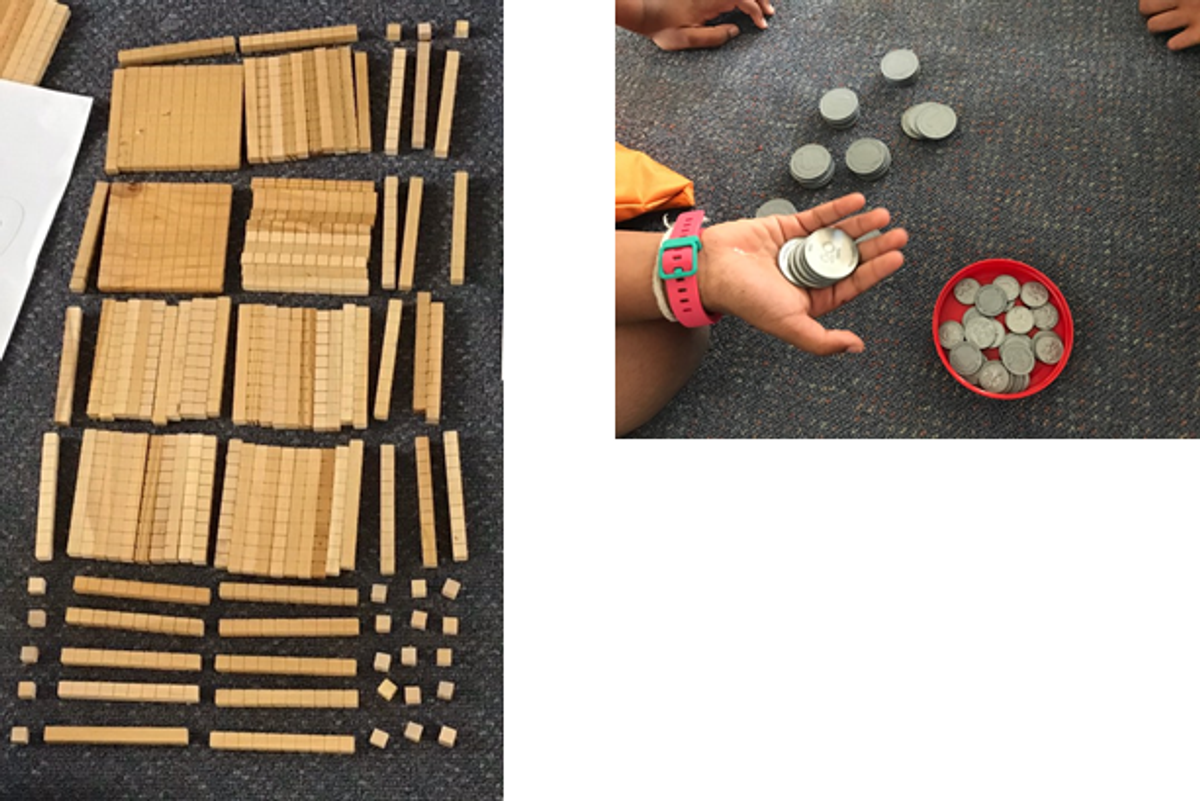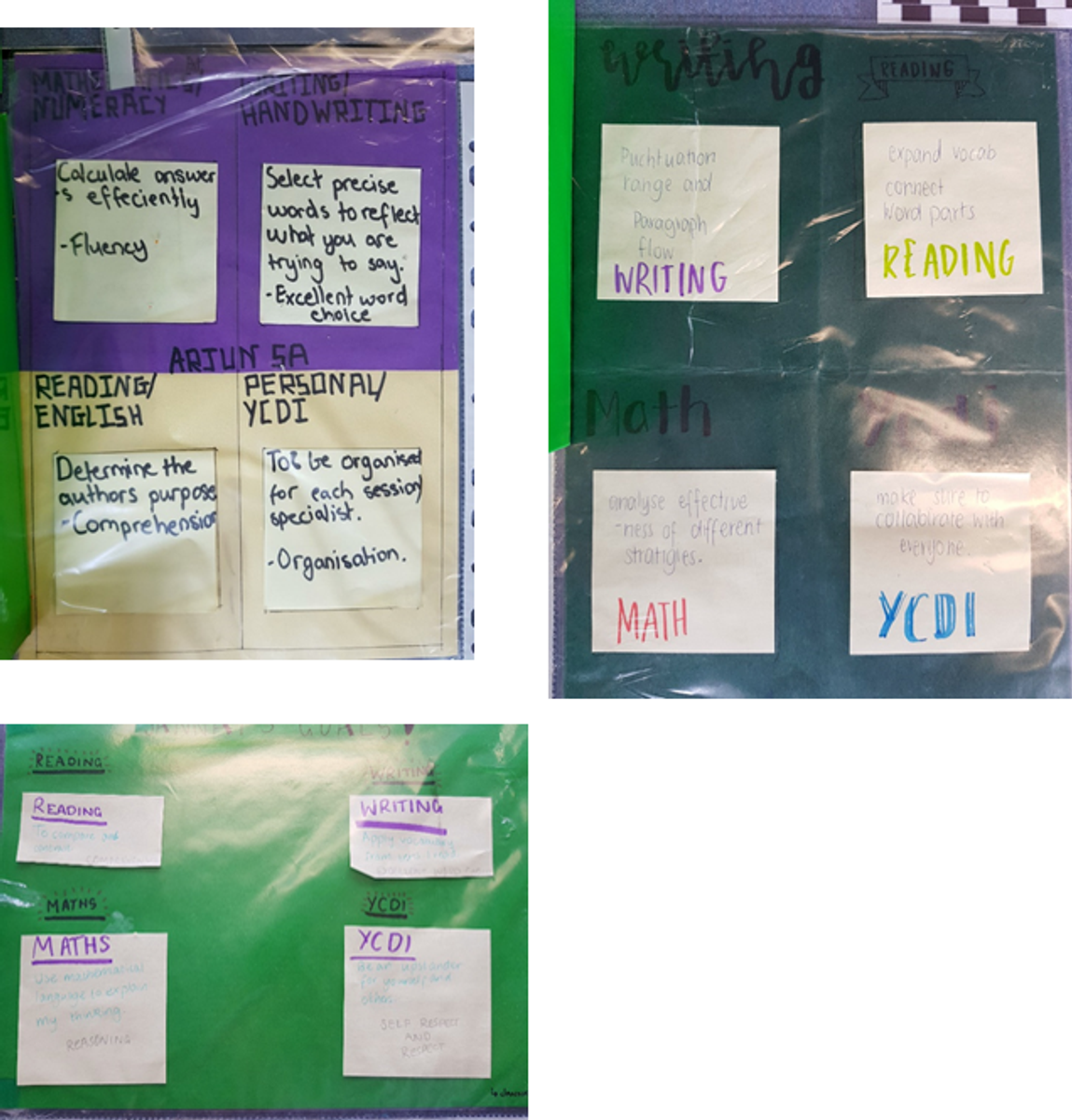Curriculum

Mathematics
In Mathematics, Level 5 students will be addressing all three standards of the Victorian Curriculum this semester; focusing on Number and Algebra in Term One, and Shape, Location and Transformation.
Our first focus this term is establishing students’ understanding of the place value system and number relationships. This involves connecting concepts of the ‘base ten’ system, decimals, and the language behind numbers, estimation and rounding. Students will explore a variety of strategies around number operations, including addition, subtraction, multiplication and division. They will focus on answering and creating problem solving questions in verbal, written, pictorial and numerical form. In addition to this, learners will develop their understanding of Cartesian planes and their purpose in every-day life.
Examples of Concrete representations of thinking in the classroom, 23 x 46
Literacy
In Reading, learners will be analysing persuasive texts to identify how the author achieves intent and creates impact on the reader. They will be provided with the opportunity to view a variety of texts throughout the unit from both student and adult authors, and compare the effectiveness of the different persuasive techniques used. There will be a close focus on language and how specific word choices help the author convince the reader.
This term in Writing, we are continuing our focus on persuasive Writing, through the lens of the author. We will be looking to transfer the skills learnt from reading and apply them to our writing. Creating strong paragraphs through the acronym TEEL (topic sentence, evidence, example and linking) will be a focus as well as applying persuasive techniques to our writing such as the ‘Facts and Statistics’ (When truthful information is given to back up a point) and ‘Emotive Language’ (When words are used to make the reader feel a certain emotion. Learners will also continue with sustained writing this Term as they are provided with the opportunity to write about a topic of their choice and in a style they desire.
As the focus of the start of the school year is on building relationships and routines, students are already practising their communication skills by getting to know their new teachers and classmates. They will also have formal Speaking and Listening opportunities such as; debating, presentations, class discussions and class reflections.
In Spelling, learners will continue to identify their personal words by finding incorrectly spelt words from their writing book and inquiring into them throughout the week. There will be a new focus each week and in Term One, such as; double consonants and homophones. At home, you can ask your child what they have learnt about their spelling words from their spelling inquiry during the week.
Inquiry
In Term One, during Inquiry lessons students will explore the big question, “How do we develop as a whole child in a global context?” This focus allows a greater understanding of the impact our surroundings and upbringing have on our development.
More specifically, students will investigate this topic through the lens of Global Goal 10, Reduced Inequalities. During this, they will understand the impact of different factors such as, wealth, socioeconomics, education, food, water and culture, have on the development of a young person as well as the effect of these into adulthood. Using the lens of a Global Citizen, learners will identify a specific topic they are passionate about and explore their responsibilities as Global Citizens by initiating change to support reducing inequalities.
Our learning will be extended beyond the classroom in Beechworth, where students will be able to make connections to their prior learning through personal experiences and collaboration with their peers. Upon our return to school, they will learn about the historical inequalities in Australia, the cross-generational effect and the way our country is working on reducing these inequalities.
Student Samples of Learning Goals
Student Reflection
‘How have you made connections to your learning community so far?’
Shuchi Erugur - By listening to what other people have been saying during our morning community circle.
Aarav Naik - I have learned that some people [in my class] have the same thinking as me.
Shaurya Sachdev - I have made connections with new people in my class by being kind to them and getting to know them well.
Social and Emotional Learning
As a student-centred school, the wellbeing, thinking and resilience of our learners are of the essence. Our beginning focus for 2020 stems from careful analysis of student voice data gathered towards the latter half of 2019:
- To build lasting and respectful relationships within and beyond classrooms;
- Develop student understandings of ‘equity’ in contrast to equality;
- And strengthen levels of emotional resilience towards personal and social situations.
In integration with our school’s ‘You Can Do It!’ (YCDI!) program and new unit of Drama in Year Five, our learners will have the opportunity to expand on a wide range of abilities through social stories, group discussions and varied role-plays. This encourages learners to exhibit respectful behaviours during class and yard times, and provides learners with reflective tools to overcome tough social and personal obstacles. It is also in alignment with the Whole School theme of ‘Identity’ this term which helps ensure our learners deepen their sense of place and belonging, and perspectives of our school community in a global context.
NAPLAN
As a Victorian government school, students in Years 3, 5, 7 and 9 are assessed within two week period each year using national tests in Reading, Writing, Language Conventions (spelling, grammar and punctuation) and Numeracy. This year, the NAPLAN Online tests will take place from Tuesday 12th May to Friday 22nd May in Term Two.
It is important to note that our school is commencing a second year with conducting assessments ‘online’. Benefits include allowing students to draft and revise texts with more flexibility, raising attention to completion of questions and providing consistency of tools for mathematical assessments. Please be aware that whilst the tests provide parents and schools with an understanding of how individual students are performing at the time of the tests, the NAPLAN do not replace the extensive, ongoing assessments made by teachers about each student’s performance.
Any adjustments or alternative arrangements to the nature of the test(s) will be communicated at the beginning of Term Two.





